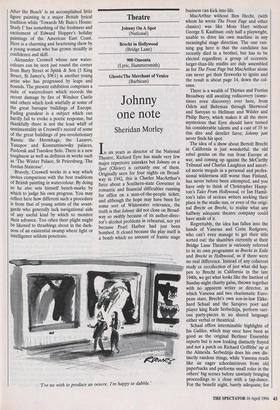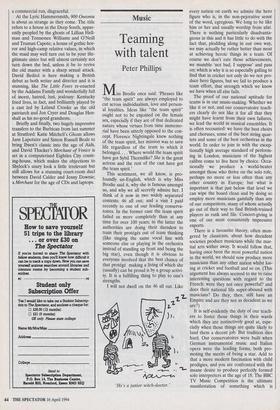Theatre
Johnny On A Spot (National) Brecht in Hollywood (Bridge Lane) 900 Oneonta (Lyric, Hammersmith) Ghosts/The Merchant of Venice (Barbican)
Johnny one note
Sheridan Morley
In six years as director of the National Theatre, Richard Eyre has made very few major repertoire mistakes but Johnny on a Spot (Olivier) is certainly one of them. Originally seen for four nights on Broad- way in 1942, this is Charles MacArthur's farce about a Southern-state Governor in romantic and financial difficulties running for office on a man-of-the-people ticket; and although the hope may have been for some sort of Whitewater relevance, the truth is that Johnny did not close on Broad- way so swiftly because of its author-direc- tor's alcohol problems in rehearsal, nor yet because Pearl Harbor had just been bombed. It closed because the play itself is a bomb which no amount of frantic stage `I've no wish to produce an oeuvre, I'm happy to dabble.' business can kick into life.
MacArthur without Ben Hecht, (with whom he wrote The Front Page and other classics) was like Moss Hart without George S. Kaufman: only half a playwright, unable to drive his own machine in any meaningful stage direction. The one run- ning gag here is that the candidate has recently died in a brothel, but has to be elected regardless; a group of eccentric larger-than-life misfits are duly assembled as for The Front Page but MacArthur alone can never get their fireworks to ignite and the result is about page 14, down the col- umn.
There is a wealth of Thirties and Forties Broadway still awaiting rediscovery (some- times even discovery) over here, from Odets and Behrman through Sherwood and Saroyan to Hellman and Wilder and Philip Barry, which makes it all the more mysterious that Eyre should have turned his considerable talents and a cast of 35 to this dire and derelict farce; Johnny just never finds his spot.
The idea of a show about Bertolt Brecht in California is just wonderful: the old rebel genius on the run from Europe at war, and coming up against the McCarthy Tribunal and Charles Laughton and assort- ed movie moguls in a personal and profes- sional wilderness still worse than Finland, has never before been attempted, and you have only to think of Christopher Hamp- ton's Tales From Hollywood, or Ian Hamil- ton's tales of serious writers seeking their place in the studio sun, or even of the origi- nal Brecht on Brecht, to realise what any halfway adequate theatre company could have made of it.
Regrettably, the idea has fallen into the hands of Vanessa and Corin Redgrave, who can't even manage to get their title sorted out: the shambles currently at their Bridge Lane Theatre is variously referred to in its own programme as Brecht in Exile and Brecht in Hollywood, as if there were no real difference. Instead of any coherent study or recollection of just what did hap- pen to Brecht in California in the late 1940s, we get what looks like the hastiest of Sunday-night charity galas, thrown together with no apparent writer or director, in which Vanessa and two charismatic Euro- pean stars, Brecht's own son-in-law Ekke- hard Schaal and the Sarajevo poet and player king Rade Serbedzija, perform vari- ous party-pieces in no shared language either verbal or theatrical.
Schaal offers interminable highlights of his Galileo, which may once have been as good as the original Berliner Ensemble reports but is now looking distinctly frayed and not a patch on Richard Griffiths' up at the Almeida. Serbedzija does his own dis- tinctly random things, while Vanessa reads like an eager schoolmistress from old paperbacks and performs small roles in the others' big scenes before unwisely bringing proceedings to a close with a tap-dance. For the benefit night, barely adequate; for a commercial run, disgraceful.
At the Lyric Hammersmith, 900 Oneonta is about as strange as they come. The title refers to a house in the Deep South, appar- ently peopled by the ghosts of Lillian Hell- man and Tennessee Williams and O'Neill and Truman Capote; a house of gothic hor- ror and high-camp relative values, in which the maid may well turn out to be your ille- gitimate sister but will almost certainly not turn down the bed, unless it be to revive the old master with a sharp sexual attack. David Bedird is here making a British debut as both writer and director and it is stunning, like The Little Foxes re-enacted by the Addams Family and wonderfully full of incest, hatred, lust, jealousy: Kentucky fried lives, in fact, and brilliantly played by a cast led by Leland Crooke as the old patriarch and Jon Cryer and Douglas Hen- shall as his no-good grandsons.
Briefly and finally, two hugely impressive transfers to the Barbican from last summer at Stratford: Katie Mitchell's Ghosts allows Jane Lapotaire and Simon Russell Beale to bring Ibsen's classic into the age of Aids, and David Thacker's Merchant of Venice is set in a computerised Eighties City count- ing-house, which makes the objections to Shylock's usury look a little irrelevant but still allows for a stunning court-room duel between David Calder and Jenny Downie; a Merchant for the age of CDs and laptops.



























































 Previous page
Previous page